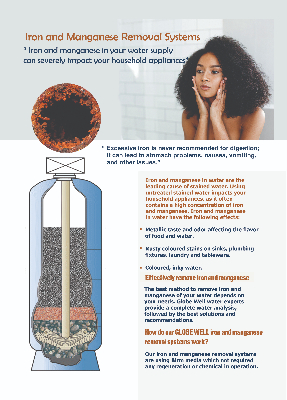GLOBE WELL Iron and Manganese Removal Systems
Iron and manganese in the water supply can severely impact the household appliances and the pipe network and will cause a stained water as it often contains a high concentration of iron and manganese.
Iron and manganese in water have the following effects:
Metallic taste and odor affecting the flavor of food and water
Rusty colored stains on sinks, plumbing fixtures, laundry and tableware
Colored, inky water
Effectively remove iron and manganese;
The best method to remove iron and manganese from the water, depends on the needs, for design the right system for the water supply, GLOBE WELL water experts provide a complete water analysis, followed by best practice recommendations.
GLOBE WELL iron and manganese removal systems:
Birm Filter is the most efficient and economical way to reduce dissolved iron and manganese compounds
Birm Filter Offer a long material life and only requires periodic backwashing
Birm Filter
Birm is an efficient and economical media for the reduction of dissolved iron and manganese compounds from raw water supplies. It may be used in either gravity fed or pressurized water treatment systems.
Birm media is a granular filter media, Physically, Birm media is essentially a mixture of Manganese and sand. This media is one of the most common filter medias used in iron filter systems which reduce/remove iron, Manganese.
Birm acts as an insoluble catalyst to enhance the reaction between dissolved oxygen (D.O.) and the iron compounds. In ground waters the dissolved iron is usually in the ferrous bicarbonate state due to the excess of free carbon dioxide and is not filterable. Birm, acting as a catalyst between the oxygen and the soluble iron compounds, enhances the oxidation reaction of iron and produces ferric hydroxide which makes the iron combine into sediment particles and then easily filtered.
The physical characteristics of Birm provide an excellent filter media which is easily cleaned by backwashing to remove the precipitant. Birm is not consumed in the iron removal operation and therefore offers a tremendous economic advantage over many other iron removal methods.
Birm media advantages include:
Long material life with relatively low attrition loss, Wide temperature performance range and extremely high removal efficiency and also Birm does not require chemicals for regeneration, only periodic backwashing is required.
Birm Filter conditions of operation:
- Free chlorine concentration less than 0.5 ppm
- Hydrogen Sulfide should be removed prior to contact with Birm media
- Oil: None Present
When using Birm for iron removal;
it is necessary that the water; Contain no oil or hydrogen sulfide, Organic matter not to exceed 4-5 ppm, The Dissolved Oxygen content equal at least 15% of the Iron content and the pH of the water is 6.8 or more.
Chlorination greatly reduces Birms activity. High concentrations of chlorine compounds may deplete the catalytic coating.
Birm may also be used for manganese reduction with the same dependability as iron removal. In these applications the water to be treated should have a pH of 8.0-9.0 for best results. If the water also contains iron, the pH should be below 8.5. High pH conditions may cause the formulation of colloidal iron which is very difficult to filter out. All other conditions remain the same for either manganese or iron removal.
Oxidation & Air Injection:
Water needs to be oxidized in order for birm to properly filter iron from the water. This can be done with a built-in air injector in the iron filter's control valve. This air injector will pull in air through a venturi effect. This is the most economical and efficient way to oxidize the water as it requires no extra parts or additional equipment to purchase.
Birm can be installed in an automatic backwashing filter without the need for oxidization (air pumps, air injectors etc). These cases are rare and usually occur in shallow wells, smaller than 50 feet where the dissolved oxygen content is higher than 15% of the iron. Birm media cannot be used with chlorination, hydrogen peroxide injection etc.

